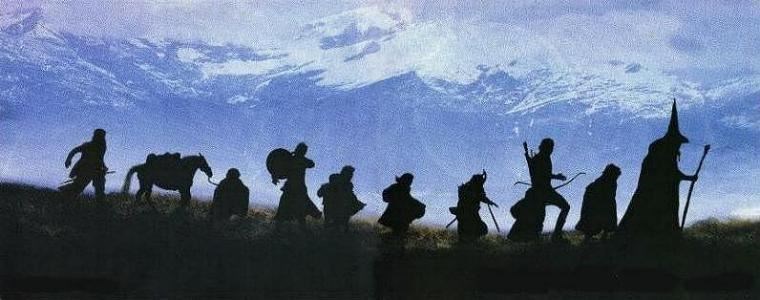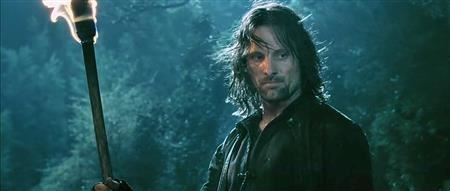Only the bravest and wisest could help to lead the expedition to destroy the most powerful source of evil in Middle Earth, and that is exactly what Aragorn did in the famous trilogy of The Lord of the Rings by J.R.R. Tolkien. Throughout this well-loved series, Aragorn displays countless acts of heroism and leadership through his bravery, selflessness, and loyalty. While each of the characters in these novels encounter their own battles, Aragorn faces the most complex situations and endures pressure from every angle (including himself). Since he is a fictional character, he has obviously been idealized to some extent. However, that does not stop him from being an exceptional heroic figure.
 |
| Gandalf and Aragorn leading the Fellowship (http://ragazzi.org/performances/archive/fellowship (eternal-image)) |
After being chosen to join the Fellowship of the Ring (this decision being based on his skill as a ranger, his knowledge of the surrounding areas, and his good relationships with elves), Aragorn mainly shares leadership with Gandalf the Grey. They work well together, fighting off enemies and strategizing the best way to Mount Doom without discouraging or worrying the rest of the Fellowship (especially the hobbits). However, after Gandalf's fall during his battle with the Balrog, Aragorn is left on his own to care for and lead the Fellowship. None of the other members of the group have nearly the amount of experience and intellect required to guide such a journey. It was largely due to Aragorn that the entirety of the Fellowship remained safe until they reached Lothlorien, where they split into separate groups. This is a testament to Aragorn's ability to stay calm and think coherently in stressful situations, as well as his ability to lead and work with an extremely diverse group of humans, elves, dwarves, and hobbits. His presence and capability serve as a quietly uniting force for the Fellowship; Aragorn is a comfort to others just by being there. His heroism is subtle in these situations, but it is very important to the Fellowship's ultimate success.
Another example of heroism that Aragorn possesses is his undying loyalty and kindness. This is demonstrated to an extent through his refusal to leave the Fellowship and to instead continue to guide the group, but Aragorn's character faces temptation after temptation in this story. One of the most obvious is through the introduction of the beautiful Eowyn, who falls in love with Aragorn and makes her feelings known to him. However, having already fallen in love with Arwen and promised to marry her, Aragorn gently turns her down. This simple action shows a great deal about Aragorn and his character, as he clearly is not only faithful, but he is also very kind and considerate when handling the emotions of another person. He could have been rude or detached in his interactions with Eowyn from then on, but instead Aragorn acted with love, grace and compassion, demonstrating yet another combination of heroic traits.
 |
| Aragorn in the forest (http://lotr.wikia.com/wiki/File:Aragorn_in_Forest. (Peter Jackson)) |
Additionally, Aragorn is an extremely humble person, having lived with elves for a good portion of his life before becoming a ranger and living in the wilderness for several years. Having been born to Gilraen, wife of Arathorn II (a king), Aragorn himself was of noble blood, although he chose to focus not on that but on a more humble lifestyle for many years of his life. However, being the rightful heir to a corrupt throne must have been all too clear to Aragorn during the many instances when the Ring was in his presence. The promise of unsurmountable power was one that likely haunted and tempted Aragorn constantly. Joined with Aragorn, the Ring would without a doubt have been reunited with Sauron, and Aragorn would assume the role of one of Sauron's subordinates as the Ring allowed evil to overtake the entirety of Middle Earth. Although wealth and fortune were probably in store for Aragorn if he were to betray the Fellowship, he focused only on the necessary good for his world. Armed with wisdom and mental strength, Aragorn resisted temptation and pressed on through hardship for the greater good.
As a writer, it was expected of Tolkien to create the battles that would lend themselves most to Aragorn's (and other characters') development. Character development only happens through the author, so of course, it was easy for Tolkien to ensure that Aragorn ended up being the archetypical hero. Aragorn clearly embodies all the qualities of an excellent hero, demonstrating wisdom, bravery, selflessness, perseverance, and humility while facing challenges and obstacles of all kinds. His mistakes make him human enough to relate to, and his qualities inspire people to be more like him -- which is exactly the effect a hero should have. Aragorn embodies strength and goodness, and encourages everyone he touches (fictional characters and living humans alike) to become the best individual they can.
Page created on 2/1/2016 12:00:00 AM
Last edited 9/6/2018 12:14:31 AM
Lieb, Lieb. "Unlikely Heroes and Their Role in Fantasy Literature". Brown University2007.
Landon, Justin. "Heroism in Lord of the Rings, Its Character Structures, and Aragorn’s Relationship to Strider.." [Online] Available http://www.staffersbookreview.com/2011/12/heroism-in-lord-of-the-rings-its-character-structures-and-.
Tolkien, J.R.R.. The Fellowship of the Ring. Allen & Unwin, 1954.
Tolkien, J.R.R.. The Two Towers. Allen & Unwin, 1954.
Tolkien, J.R.R.. The Return of the King. Allen & Unwin, 1955.
